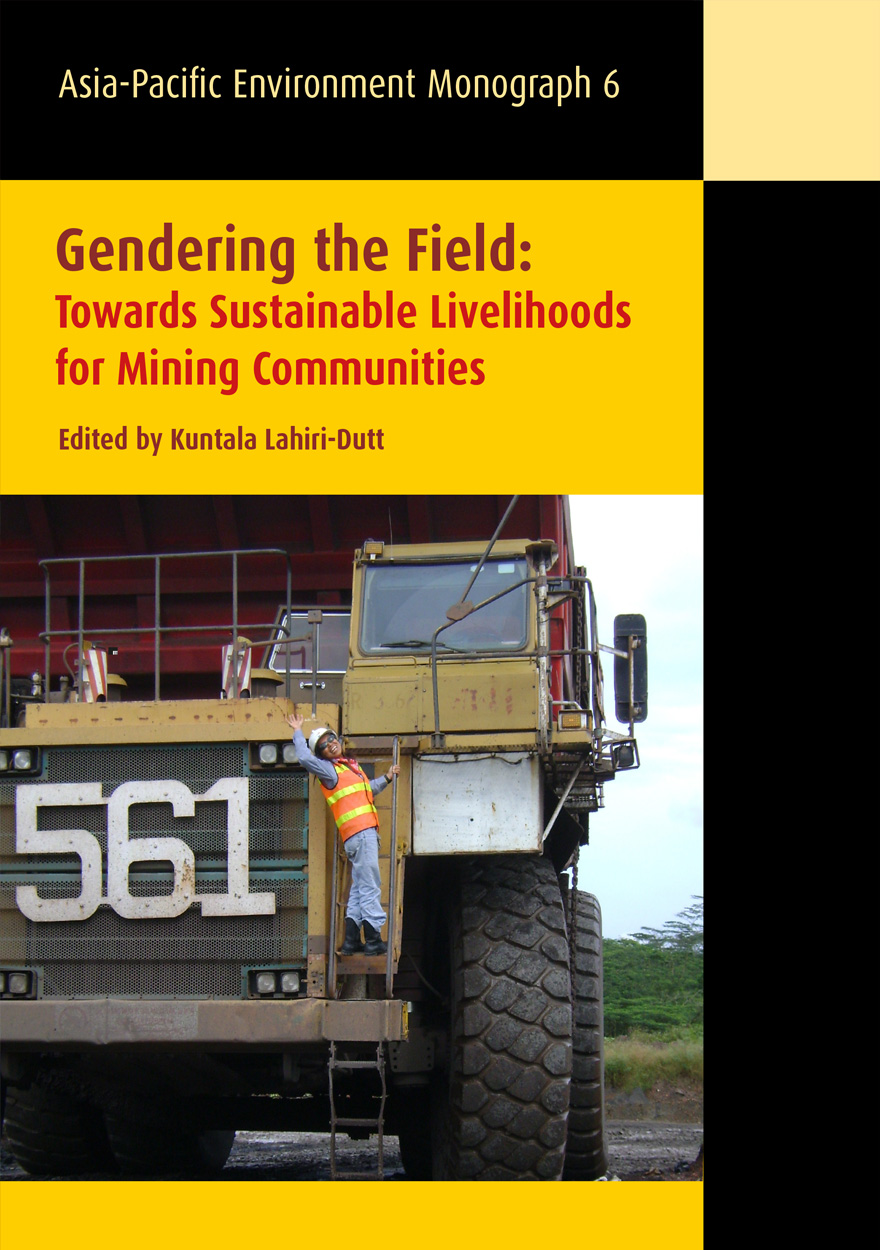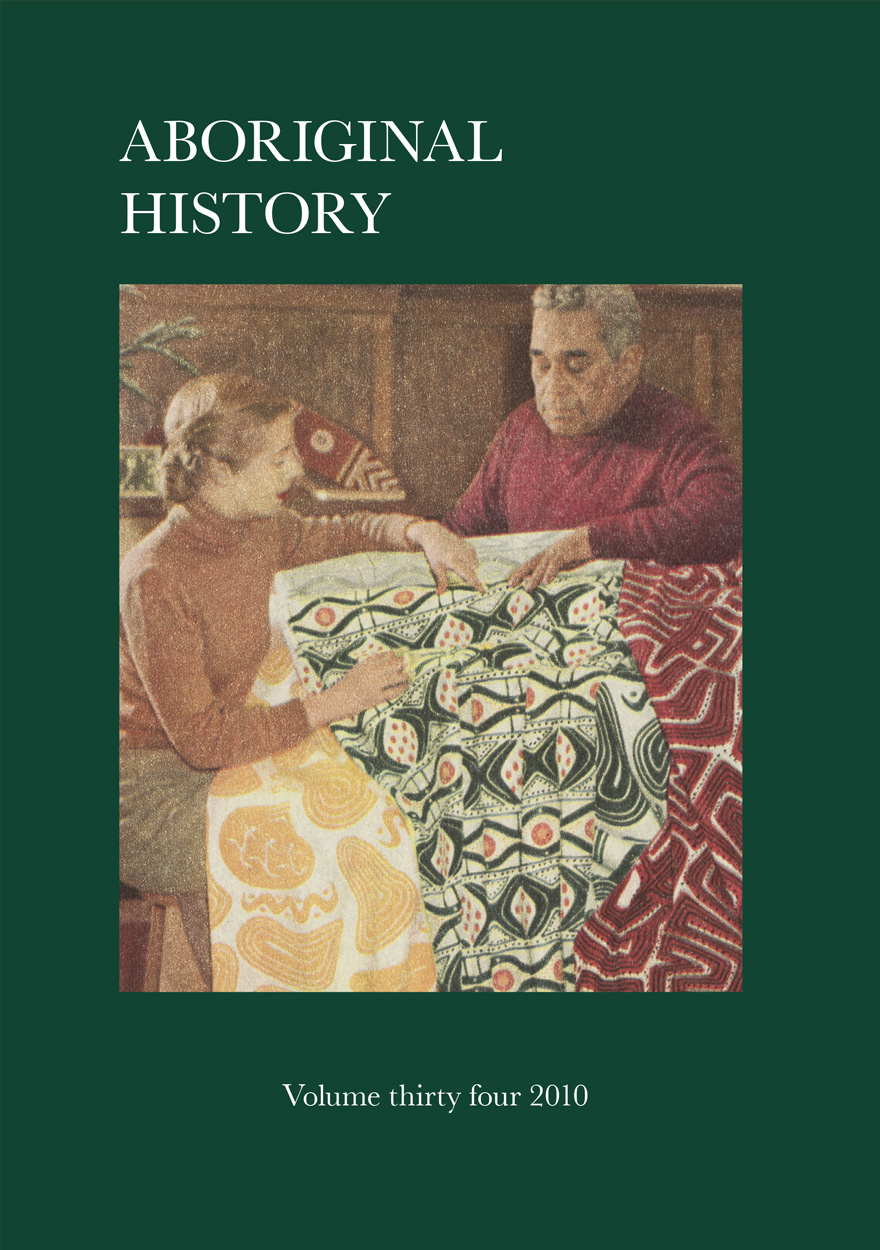Search titles
Displaying results 431 to 440 of 628.

Gendering the Field »
Towards Sustainable Livelihoods for Mining Communities
Edited by: Kuntala Lahiri-Dutt
Publication date: March 2011
The chapters in this book offer concrete examples from all over the world to show how community livelihoods in mineral-rich tracts can be more sustainable by fully integrating gender concerns into all aspects of the relationship between mining practices and mine affected communities. By looking at the mining industry and the mine-affected communities through a gender lens, the authors indicate a variety of practical strategies to mitigate the impacts of mining on women’s livelihoods without undermining women’s voice and status within the mine-affected communities.
The term ‘field’ in the title of this volume is not restricted to the open-cut pits of large scale mining operations which are male-dominated workplaces, or with mining as a masculine, capital-intensive industry, but also connotes the wider range of mineral extractive practices which are carried out informally by women and men of artisanal communities at much smaller geographical scales throughout the mineral-rich tracts of poorer countries.

Prime Ministers at The Australian National University »
An Archival Guide
Authored by: Michael Piggott, Maggie Shapley
Publication date: March 2011
The ANU Archives holds records about all 27 Australian prime ministers in the Noel Butlin Archives Centre and in the university's own archives. Prime ministers have been supporters, visitors, Council members, fellows, students, and even Chancellor of the Australian National University. Prime ministers have also been trade unionists and businessmen, and have been lobbied by trade unions, companies and industry associations, leaving their traces in the business and trade union collections of the Noel Butlin Archives Centre.
The authors, Michael Piggott (Australian Prime Ministers Centre fellow) and Maggie Shapley (ANU University Archivist), bring their considerable archival knowledge to the task of mapping prime ministers in the archival landscape and highlighting the prime ministerial riches which are found in the archives. The guide offers an extensive listing of relevant subject and personal files, minutes of meetings, rare printed items, photographs and audiovisual material, dating from the 19th to the 21st century, and ten short studies showing how these records might be used.

Ethnography & the Production of Anthropological Knowledge »
Essays in honour of Nicolas Peterson
Edited by: Yasmine Musharbash, Marcus Barber
Publication date: February 2011
Professor Nicolas Peterson is a central figure in the anthropology of Aboriginal Australia. This volume honours his anthropological body of work, his commitment to ethnographic fieldwork as a source of knowledge, his exemplary mentorship of generations of younger scholars and his generosity in facilitating the progress of others. The diverse collection produced by former students, current colleagues and long-term peers provides reflections on his legacy as well as fresh anthropological insights from Australia and the wider Asia-Pacific region. Inspired by Nicolas Peterson’s work in Aboriginal Australia and his broad ranging contributions to anthropology over several decades, the contributors to this volume celebrate the variety of his ethnographic interests. Individual chapters address, revisit, expand on, and ethnographically re-examine his work about ritual, material culture, the moral domestic economy, land and ecology. The volume also pays homage to Nicolas Peterson’s ability to provide focused research with long-term impact, exemplified by a series of papers engaging with his work on demand sharing and the applied policy domain.

In Good Faith? »
Governing Indigenous Australia through God, Charity and Empire, 1825-1855
Authored by: Jessie Mitchell
Publication date: January 2011
In the early decades of the 19th century, Indigenous Australians suffered devastating losses at the hands of British colonists, who largely ignored their sovereignty and even their humanity. At the same time, however, a new wave of Christian humanitarians were arriving in the colonies, troubled by Aboriginal suffering and arguing that colonists had obligations towards the people they had dispossessed. These white philanthropists raised questions which have shaped Australian society ever since.
Did Indigenous Australians have rights to land, rationing, education and cultural survival? If so, how should these be guaranteed, and what would people have to give up in return? Would charity and paternalism lead to effective government or dismal failure – to a powerful defence of an oppressed people, or to new forms of oppression?
In Good Faith? paints a vivid picture of life on Australia’s first missions and protectorate stations, examining the tensions between charity and rights, empathy and imperialism, as well as the intimacy, dependence, resentment and obligations that developed between missionary philanthropists and the people they tried to protect and control. In this work, Mitchell brings to life hitherto neglected moments in Australia’s history, and traces the origins of dilemmas still present today.
For more information on Aboriginal History Inc. please visit aboriginalhistory.org.au.

Aboriginal History Journal: Volume 34 »
Edited by: Shino Konishi, Maria Nugent
Publication date: January 2011
In this volume, Mitchell Rolls reconsiders the question of silence in Aboriginal history by examining a wide range of literature on Indigenous themes, which was produced during the period dubbed by W.E.H. Stanner as the ‘Great Australian Silence’. Felicity Jensz uncovers the significance of matrimony in Moravian missionaries’ attempts to Christianise Aboriginal people in the nineteenth century, and Anne McGrath traces the history and continuing legacy of relationships between Aboriginal and Irish people in Australia. Meg Parsons’ study is focused on Sir Raphael Cilento, an often overlooked figure who oversaw Queensland’s Aboriginal leprosy management strategies in the 1930s and the establishment of the Fantome Island leprosarium. Pamela McGrath and David Brooks examine William Grayden’s 1957 film Their Darkest Hour, and how it was interpreted by contemporary audiences, Indigenous activists and, finally, the Ngaanyatjarra people’s perceptions of the film now. Martin Thomas looks at the 1948 American–Australian Scientific Expedition to Arnhem Land, the Indigenous response to it and its continuing legacy. Sylvia Kleinert discusses the little-known history of Bill Onus’s Aboriginal Enterprises, a tourist outlet that fostered an influential Indigenous art scene in Melbourne and its impact on Aboriginal identity formation in south-eastern Australia. Jessie Mitchell examines questions of Aboriginal cultural performance in her study of the Aboriginal reception of Prince Alfred’s 1868 royal tour. Finally, Petter Naessan gives a rich linguistic history of the name Coober Pedy, evaluating a range of sources each claiming different Indigenous etymological origins of the name.
Aboriginal History Inc. is a publishing organisation based in the Australian Centre for Indigenous History, Research School of Social Sciences, The Australian National University, Canberra.
For more information on Aboriginal History Inc. please visit aboriginalhistory.org.au.
Download for free
Not available for purchase

Civic Insecurity »
Law, Order and HIV in Papua New Guinea
Edited by: Vicki Luker, Sinclair Dinnen
Publication date: December 2010
Papua New Guinea has a complex ‘law and order’ problem and an entrenched epidemic of HIV. This book explores their interaction. It also probes their joint challenges and opportunities—most fundamentally for civic security, a condition that could offer some immunity to both.
This book is a valuable and timely contribution to a limited but growing body of scholarship in the social and structural contexts of HIV epidemiology in Papua New Guinea. The volume offers a unique collection of interdisciplinary insights on the connections between law and order and the HIV epidemic and is presented in a manner accessible to a wide audience, scholars and lay people alike… Significantly, this is the first volume to critically examine the complex and inexorable links between HIV, gender, violence, and security within a theoretical framework that illuminates the challenges of the epidemic for PNG’s future cohesion and stability as a young nation…The importance of this courageous book cannot be overstated. While it communicates an urgent and potent message about the need for immediate action … it offers insightful reflections on the processes and possibilities of social transformation that undoubtedly will have enduring scholarly and practical value.
— Dr Katherine Lepani, Social Foundations of Medicine, The Australian National University.

Geology at ANU (1959–2009) »
Fifty years of history and reminiscences
Edited by: Judith Caton
Authored by: Mike Rickard
Publication date: December 2010
This history was undertaken to celebrate the 50th anniversary of the Geology Department at ANU, and to honour its founding professor David A. Brown. It includes contributions from some 100 former students outlining their career successes.
This history was compiled by Dr Mike Rickard, a staff member of the Department of Geology from 1963 to 1997, who also served as Head of Department for seven years. He graduated BSc and PhD from Imperial College London in 1957 and has specialised in mapping the structure of mountain chains in Ireland, Canada, Norway, and southern South America. He also mapped volcanic rocks for the Geological Survey of Fiji. He taught Structural Geology and Tectonics and has supervised field work in south eastern and central Australia. After retirement he has taught U3A courses in Earth Science.

Indigenous Participation in Australian Economies »
Historical and anthropological perspectives
Edited by: Ian Keen
Publication date: December 2010
This volume seeks to contribute to the body of anthropological and historical studies of Indigenous participation in the Australian colonial and post colonial economy. It arises out of a panel on this topic at the annual conference of the Australian Anthropological Society, held jointly with the British and New Zealand anthropological associations in Auckland in December 2008. The panel was organised in conjunction with an Australian Research Council (ARC) Linkage Grant project on Indigenous participation in Australian economies involving the National Museum of Australia as the partner organisation and the School of Archaeology and Anthropology at The Australian National University.
The chapters of the volume bring new theoretical analyses and empirical data to bear on a continuing discussion about the variety of ways in which Indigenous people in Australia have been engaged in the colonial and post-colonial economy. Contributions cover settler capitalism, concepts of property on the frontier, Torres Strait Islanders in the mainland economy, the pastoral industry in the Kimberley, doggers in the Western Desert, bean and pea picking on the South Coast of New South Wales, attitudes to employment in general in western New South Wales, relations of Aboriginal people to mining in the Pilbara, and relations with the uranium mine and Kakadu National Park in the Top End. The chapters also contribute to discussions about theoretical and analytical frameworks relevant to these kinds of contexts and bring critical perspectives to bear on current issues of development.

Radical Spaces »
Venues of popular politics in London, 1790–c. 1845
Authored by: Christina Parolin
Publication date: December 2010
Radical Spaces explores the rise of popular radicalism in London between 1790 and 1845 through key sites of radical assembly: the prison, the tavern and the radical theatre. Access to spaces in which to meet, agitate and debate provided those excluded from the formal arenas of the political nation–the great majority of the population–a crucial voice in the public sphere. Radical Spaces utilises both textual and visual public records, private correspondence and the secret service reports from the files of the Home Office to shed new light on the rise of plebeian radicalism in the metropolis. It brings the gendered nature of such sites to the fore, finding women where none were thought to gather, and reveals that despite the diversity in these spaces, there existed a dynamic and symbiotic relationship between radical culture and the sites in which it operated. These venues were both shaped by and helped to shape the political identity of a generation of radical men and women who envisioned a new social and political order for Britain.

The Rudd Government »
Australian Commonwealth Administration 2007–2010
Edited by: Chris Aulich, Mark Evans
Publication date: December 2010
This edited collection examines Commonwealth administration under the leadership Prime Minister Kevin Rudd from 2007-2010. This was a remarkable period in Australian history: Rudd’s government was elected in 2007 with an ambitious program for change. However, as the chapters in this book demonstrate, these ambitions were thwarted by a range of factors, not the least being Rudd’s failure to press ahead when he confronted ‘road blocks’ such the ETS or managing his massive agenda which constantly elevated issues to ‘first order priority’. Although he started his term with stratospheric approval ratings, only two years later his support had collapsed and on 24 July 2010 he became the first sitting Prime Minister to be removed by his own Party before the expiry of his first term.
In this book, expert contributors consider the Rudd Government’s policy, institutional and political legacy. The 14 chapters are organized into four sections, outlining the issues and agendas that guided Rudd’s government, changes to the institutions of state such as the public service and parliament, followed by discussions of key issues and policies that marked Rudd’s term in office. The final section examines Rudd’s leadership and reflects on the personal foibles and political factors that brought his Prime Ministership undone. The Rudd Government has been produced by the ANZSOG Institute for Governance at the University of Canberra. It is the tenth in a series of books on successive Commonwealth administrations. Each volume has provided a chronicle and commentary of major events, policies and issues that have dominated successive administrations since 1983. As with previous volumes in the series, contributors have been drawn from a range of universities and other organisations.



